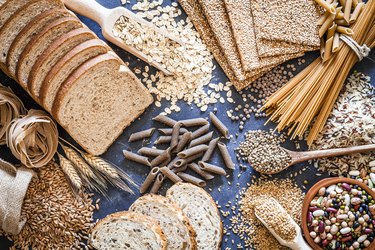
As your primary fuel source, carbohydrates are important to your body. If you hope to perform to your potential during athletic activity, you must adjust your carb intake to match your energy output — too many carbs can lead to fat gain, and too few carbs can leave you sluggish and fatigued.
Tip
How you adjust your diet for working out depends on your fitness goals. Adjust your carbs to match your energy output.
Video of the Day
Typical Workout
Most people who exercise do it casually for the health and weight loss benefits. If you exercise up to an hour per day on most days of the week, you don't necessarily need to adjust your carb intake from the normal range — about 60 percent of your total calories, according to the U.S. Food and Drug Administration. Keep a food diary for a few days and record how you feel. If you notice that your carb intake is within the recommended range but you are lagging behind on your exercise routine, try tailoring your intake to your sport.
Video of the Day
Diet for Working Out
Weightlifters need protein as part of their diet for working out, for muscle repair and growth, but carbohydrates are important too. Any carbohydrates that your body doesn't use for immediate energy become stored as glycogen, which helps to power your workouts. If you don't eat enough carbs, your glycogen stores empty out and your body turns to fat and protein for energy.
If you're constantly stressing and trying to build muscle, you want as much protein as possible to go to your muscle tissue, not toward energy production. Most weightlifters do well on a normal carb intake, but if you're feeling slow and "heavy," try increasing it slightly. That small increase can be enough to help you restock your energy stores. Eating the bulk of your carbs before and after a workout can help the energy be available when you need it, too.
Intense Cardio and Carbs
If you're a serious runner, swimmer or cyclist, your workout is fueled almost entirely by carbohydrates. Training for two to four hours daily increases your need for carbs.
If you're "hitting the wall" too early in your sessions, try increasing your carb intake incrementally, and don't forget to eat small amounts of carbs every hour or so during your workout.
Plan your meals three to four hours prior to a long event, and aim for three to four grams per kilogram of body weight for carb intake, recommends the US Anti-Doping Agency (USADA). To help avoid stomach upset during long events, reduce your carb intake the closer you are to the event start — one to two grams per kg if eating within one to two hours of the start of an event.
Try Carb Loading
If you have an event coming up, you can do better than relying on your normal glycogen stores to get you over the finish line. Emptying and re-loading the glycogen can give you a more sustained source of energy, and may help you get that second wind during the last half of the race. This process is called carbohydrate-loading.
Drop your pre-workout carbs to about 50 percent of your total daily calories about seven days out, then increase it to around 70 percent of your total three or four days prior to the event. Adjust your protein and fat intake to compensate for the fluctuating carb intake — it is important you remain at your normal calorie level despite the carb level. Have a small, easily digestible meal the morning of the race, and fly toward the finish.